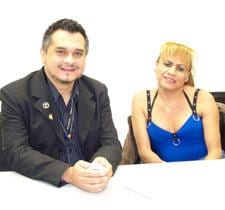“It would be nice to come here one day and visit without having to share stories of the ugly things that happen back home,” said Guatemalan activist Jorge Lopez before a talk, translated from Spanish, at the AIDS Committee of Toronto on Mar 4.
Lopez, the director of OASIS (Organizacion de Apoyo a una Sexualidad Integral frente al SIDA, which translates to the Organization to Support an Integral Sexuality to Confront AIDS) was in Toronto as part of a tour that also included Ottawa and Montreal to talk about the realities for queer people in Guatemala and Central America. Lopez was accompanied by Zulma, a trans woman who volunteers with OASIS and in 2005 survived an attack by Guatemalan police that killed another trans woman.
“I feel safe walking the streets here,” says Zulma, who witnessed OASIS employee Paulina shot by four members of the Civil National Police in Guatemala City on Dec 16, 2005; she later died of her wounds.
Zulma was shot in the arm and face in the same attack. She lost several teeth and had her jaw wired shut for eight months as a result.
Despite the face that Guatemala’s human rights ombudsman Sergio Morales called for an investigation in 2006, Paulina’s murder has not yet come to trial.
“Paulina’s case is sleeping in the Guatemalan courts,” says Lopez. He describes his hope that Paulina’s killers would be brought to justice as a “big illusion.”
Fearing for her life after being followed and receiving several death threats, Zulma hid in a safe house for two years after the 2005 attack, not once leaving the location.
“I only leave my house once a week now,” says Zulma, adding that she thanks international human rights organizations for their efforts which she credits with helping her live a safer life by keeping an eye on her and her situation.
Zulma and Lopez gave three talks in Toronto as part of the tour, sponsored by Peace Brigades International and the Justice, Global and Ecumenical Relations Unit of the United Church of Canada.
Lopez and Zulma say they came to Canada with two objectives: “To talk about situations in Guatemala that Canadians do not hear about,” says Zulma, and two, “To make alliances with organizations and people who want to help our cause in any way,” says Lopez.
OASIS was founded in 1993 and started doing work in the streets of Guatemala City, handing out condoms. “You had to be part of our secret world to access OASIS in those days,” says Lopez.
Today OASIS has a two-storey, 12-room house in Guatemala City and approximately 250 registered members. “We are small, diverse communities that make up a whole,” says Lopez.
Twenty-five volunteers work under the direction of Lopez, who says he often works 18-hour days, sleeping at his desk many nights. Lopez says 40 percent of OASIS’s clients are from Guatemala City, 30 percent are from surrounding cities and the remaining 30 percent are people from surrounding Central American countries seeking safety.
OASIS offers HIV-testing done on premises, runs support programs for people who are HIV-positive, facilitates workshops in schools and community organizations and hands out condoms at clubs and on the streets. The organization also keeps records of violent crimes against queer people and attempts to bring these to the attention of the international community.
“El poder lo tenemos en la boca [We hold the power in our voice],” says Lopez.

 Why you can trust Xtra
Why you can trust Xtra


